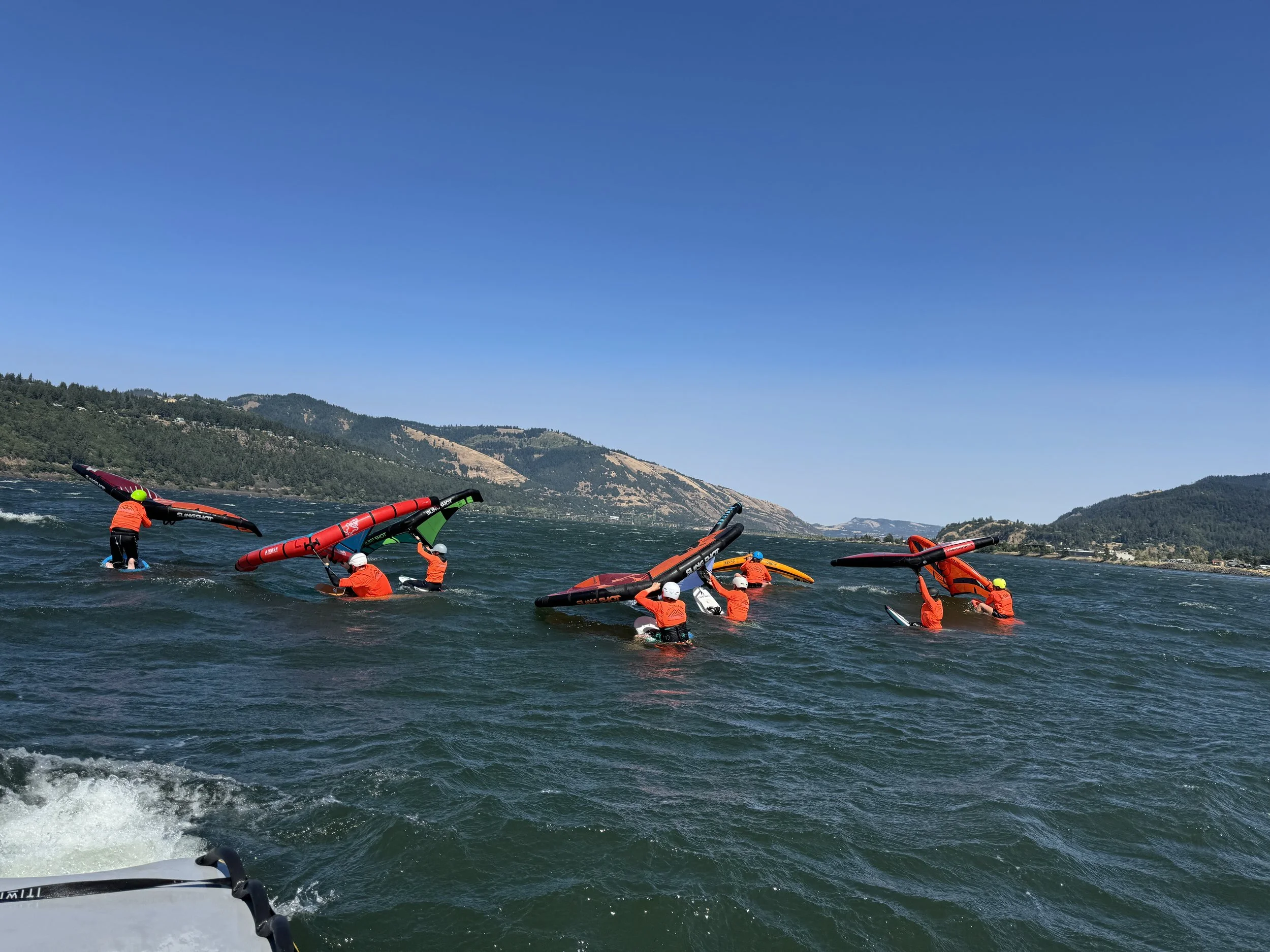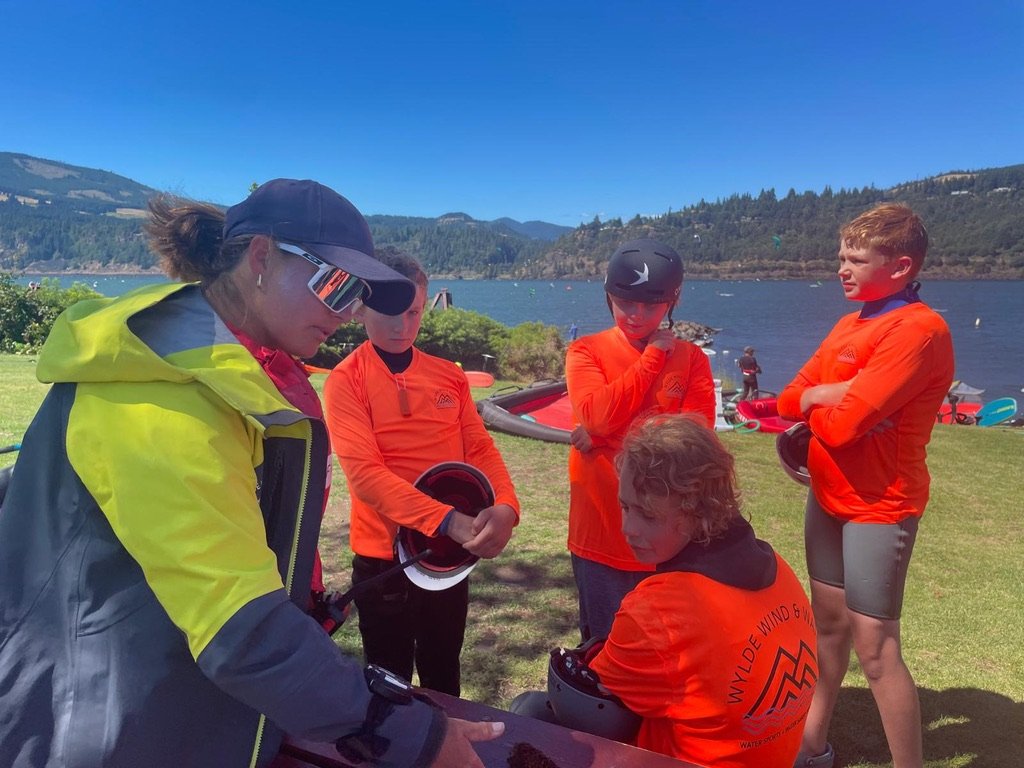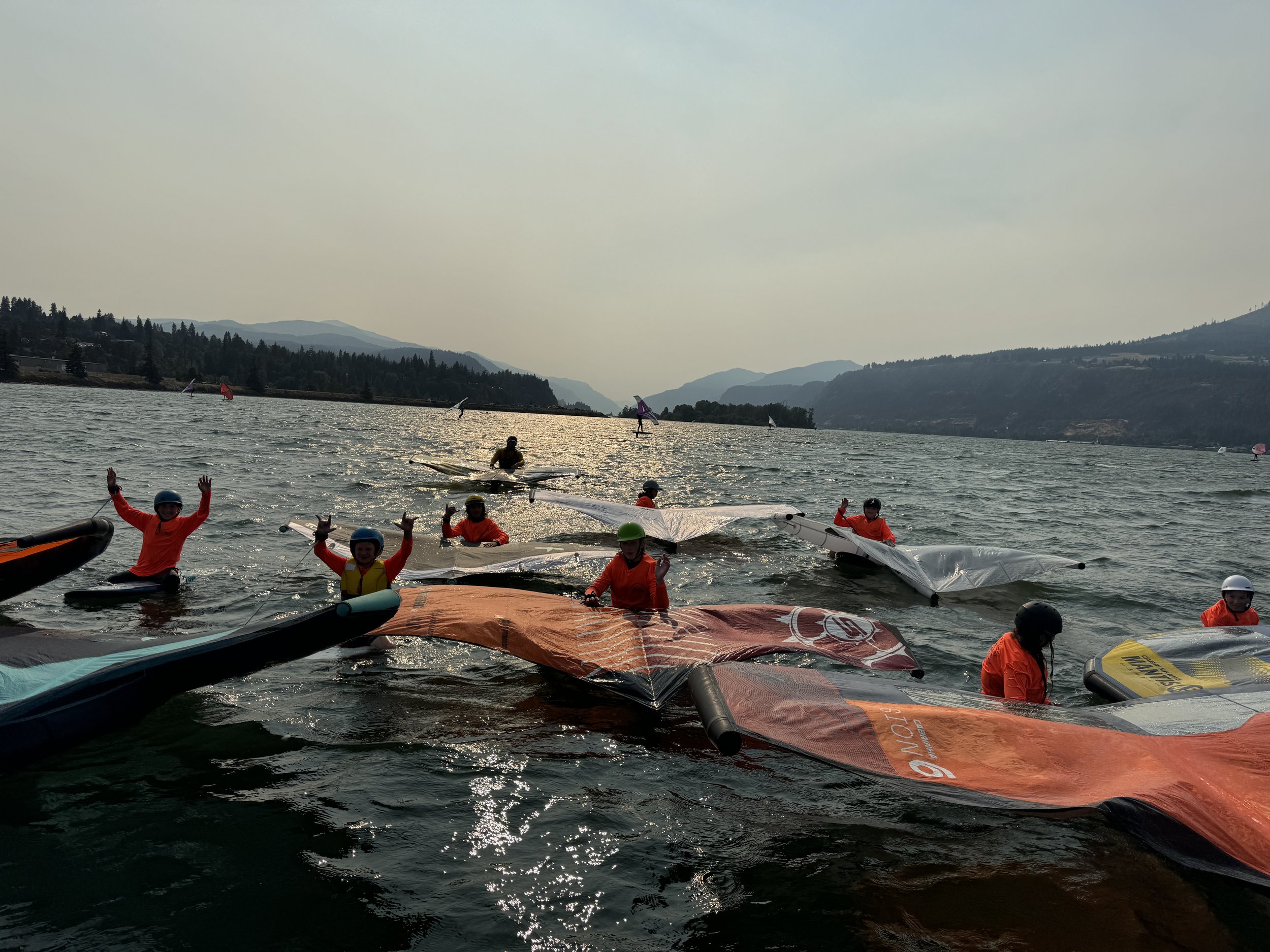Wingfoil Youth Team
Summer long youth Team designed to elevate young Wingfoilers skills and confidence in the water through a fun team environment. Wingfoilers will consistently sail together getting the opportunity to be coached by professional coaches, including Fiona Wylde, to improve all skills relating to wingfoiling. The primary objective for the Wingfoil Youth Team is to develop well rounded wingfoilers by working on a broad range of skills including wingfoil freestyle, racing, swell riding, and teamwork. A central focus of the wingfoil youth team is water safety and team camaraderie. Team riders will be encouraged to compete in local events.
Sport is the conveyor belt to learn larger life lessons like being on time, being a strong and supportive teammate, learning how to positively face new challenges with humility and respect, all while gaining personal confidence. The Wingfoil Youth Team will teach students how to become individually motivated and set goals by utilizing organizational techniques that promote success throughout life. We run the Wingfoil Youth Team and all Wylde Wind & Water programs with this ethos to provide growth opportunities for all participants.
Wingfoil Youth Team will train in the Columbia River from the Event Site. All wingfoilers must have a minimum ability to foil in control and sail upwind making the majority of their maneuvers (tacks/gybes). If you are not at that level yet, that is ok! Check out our Next Steps Wingfoil Youth Camp.
FAQs
-
Wingfoilers must be between 12 and 18 years old. For the safety of the team riders, you must be able to stay up wind, ride the foil in control, and make the majority of their transitions (tacks or gybes). The Wingfoil Youth Team is limited to 20 team riders to keep a low coach to student ratio for safety and learning purposes.
-
Wingfoil Youth Team trains twice a week on Monday and Wednesday afternoons from June 23, 2025 to August 20, 2025 from 3-5:30pm. We will meet at the Wylde Wind & Water Event Site Center and be launching from the Event Site.
-
Team riders are responsible for bringing their own equipment including, wings, board, foil, pump, helmet, impact vest, wetsuit, and whistle. If you do not have your own equipment or have equipment questions, please contact us: info@wyldewindandwater.org
-
Fiona Wylde, professional water woman, Wingfoil Champion, 3x SUP World Champion and Wylde Wind & Water founder, will coach the Wingfoil Youth Team along side other local experienced waterwomen and watermen, to create a dynamic, skilled, fun and safe team.
-
The cost for the summer Wingfoil Youth Team is $550.00.
Scholarships are available if you require financial assistance to participate. Please send an email to info@wyldewindandwater.org and request information about scholarships.
-
Full refunds will be offered for cancellations made before Wingfoil Youth Team starts. Cancellations made within the Summer WFYT program will not receive a refund.
2025 WINGFOIL YOUTH TEAM KEY OUTCOMES/LEARNING AREAS
Wingfoil Skills Development
Become confident in all wind and water conditions. (Light wind, strong wind, small chop, big swell)
Improve complete control of wingfoil equipment at all times.
Improve maneuvers; tacks and gybes, in all settings and weather conditions.
Racing development: learn and comprehend the basics of slalom and course racing. Practice race starts and courses.
Freestyle: development an understanding of heat management, trick control, and practice tricks.
Swell riding: Efficiently understand how to ride the swell and improve comfort in swell.
Learn to switch feet and ride heel side confidently both directions.
Personal Skills Development
Will complete basic goal setting, including a short talk with the coach (will be recorded in coaches journal). Coaches will check in with participants over the summer about goal progression.
Participants will keep track of workouts and lessons in their journals and will be given projects throughout the season. Projects may include planning training sessions for the team based on wind, current, and other conditions; approaching different emergency situations; and educating the public about water safety conditions in the Columbia River Gorge.
Water Safety Skills Development
Understand how to interpret and use protective measures/strategies against conditions such as wind, current, temperature, and sun.
Understand the UV index system and protective measures against sun exposure.
Develop swimming endurance, specifically focused on learning the survival swimming strategies—including sidestroke and elementary backstroke.
Learn how to help a person in distress while on the river.
Understand different safety measures/protective features for aquatic outings such as lifejackets, helmets, leashes, and personal safety systems.
Understand and practice basic in-water rescue techniques.
Understand the professional emergency response system for emergencies in the Columbia River Gorge, including the 911 call process and the professional rescue/care process.
Understand what drowning looks like and how to respond appropriately.
Learn relevant parts of the WW&W emergency action plan, including what to do/expect in an emergency.
Understand the purpose and appropriate use of a whistle on the water.
Understand the indications for use and proper technique of throwing assists using a throw rope and ring buoy.
Be familiar with rescue equipment such as lifeguard tubes, ring buoys, throw bags, rescue cans, backboards, lifeboards, etc.
DAILY OUTLINE
3:00pm | Sailors rigged and ready to go by 3pm. Briefing by coaches to describe training plan; goal setting/check-in about goals.
3:10pm | Launch / Sail upwind to Wells Island Mark using the upwind sailing as your warm-up. *subject to change
3:30pm | Drills: races; freestyle; swell riding; water safety practice.
5:00pm | Sail back to event site.
5:10pm | De-rig equipment, post training debrief
5:30pm | Practice done






